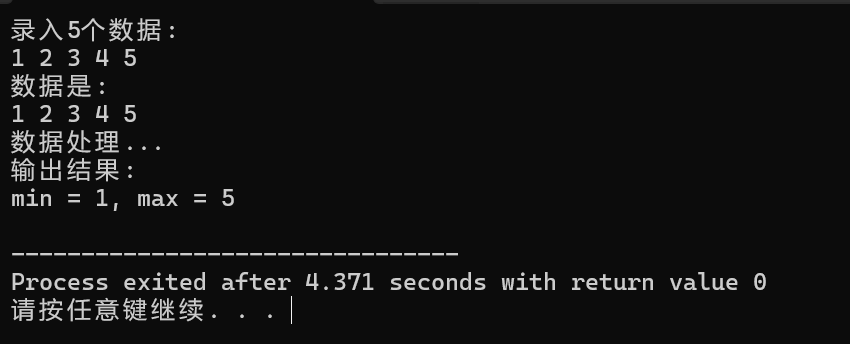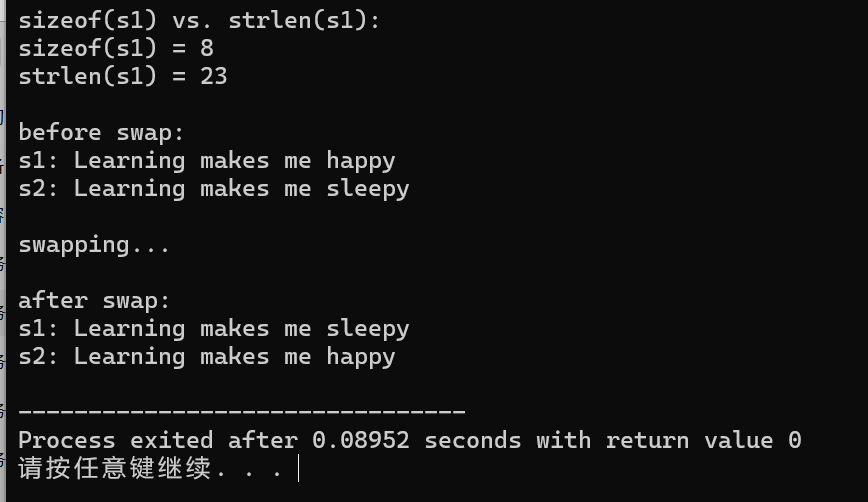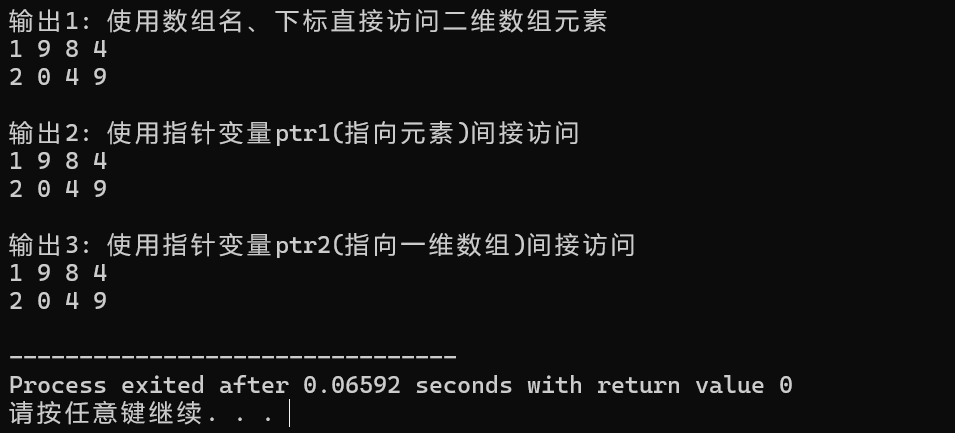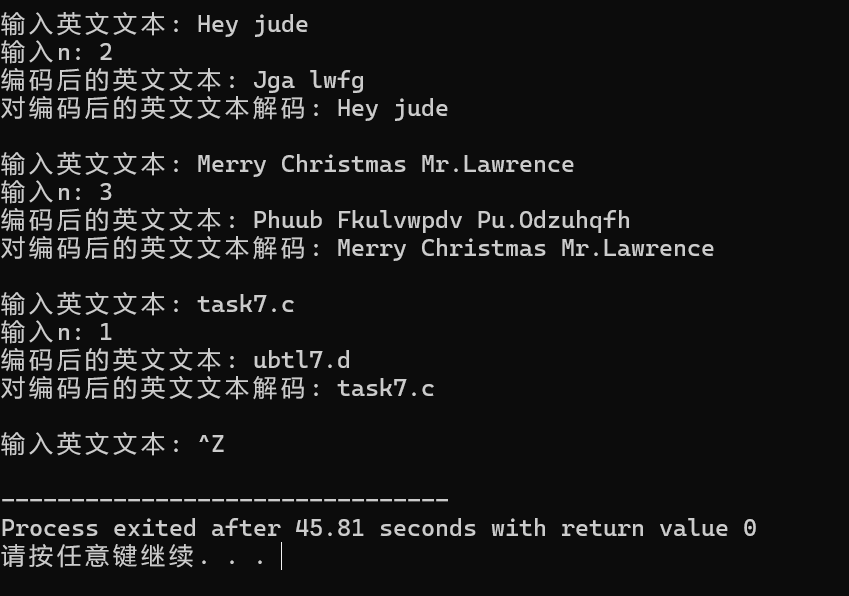task1:
1 #include <stdio.h> 2 #define N 5 3 4 void input(int x[], int n); 5 void output(int x[], int n); 6 void find_min_max(int x[], int n, int *pmin, int *pmax); 7 8 int main() { 9 int a[N]; 10 int min, max; 11 12 printf("录入%d个数据:\n", N); 13 input(a, N); 14 15 printf("数据是: \n"); 16 output(a, N); 17 18 printf("数据处理...\n"); 19 find_min_max(a, N, &min, &max); 20 21 printf("输出结果:\n"); 22 printf("min = %d, max = %d\n", min, max); 23 24 return 0; 25 } 26 27 void input(int x[], int n) { 28 int i; 29 30 for(i = 0; i < n; ++i) 31 scanf("%d", &x[i]); 32 } 33 34 void output(int x[], int n) { 35 int i; 36 37 for(i = 0; i < n; ++i) 38 printf("%d ", x[i]); 39 printf("\n"); 40 } 41 42 void find_min_max(int x[], int n, int *pmin, int *pmax) { 43 int i; 44 45 *pmin = *pmax = x[0]; 46 47 for(i = 0; i < n; ++i) 48 if(x[i] < *pmin) 49 *pmin = x[i]; 50 else if(x[i] > *pmax) 51 *pmax = x[i]; 52 }

task1_2
1 #include <stdio.h> 2 #define N 5 3 4 void input(int x[], int n); 5 void output(int x[], int n); 6 int *find_max(int x[], int n); 7 8 int main() { 9 int a[N]; 10 int *pmax; 11 12 printf("录入%d个数据:\n", N); 13 input(a, N); 14 15 printf("数据是: \n"); 16 output(a, N); 17 18 printf("数据处理...\n"); 19 pmax = find_max(a, N); 20 21 printf("输出结果:\n"); 22 printf("max = %d\n", *pmax); 23 24 return 0; 25 } 26 27 void input(int x[], int n) { 28 int i; 29 for(i = 0; i < n; ++i) 30 scanf("%d", &x[i]); 31 } 32 33 void output(int x[], int n) { 34 int i; 35 for(i = 0; i < n; ++i) 36 printf("%d ", x[i]); 37 printf("\n"); 38 } 39 40 int *find_max(int x[], int n) { 41 int max_index = 0; 42 int i; 43 44 for(i = 0; i < n; ++i) 45 if(x[i] > x[max_index]) 46 max_index = i; 47 48 return &x[max_index]; 49 }

task2_1
1 #include <stdio.h> 2 #include <string.h> 3 #define N 80 4 5 int main() { 6 char s1[N] = "Learning makes me happy"; 7 char s2[N] = "Learning makes me sleepy"; 8 char tmp[N]; 9 10 printf("sizeof(s1) vs. strlen(s1): \n"); 11 printf("sizeof(s1) = %d\n", sizeof(s1)); 12 printf("strlen(s1) = %d\n", strlen(s1)); 13 14 printf("\nbefore swap: \n"); 15 printf("s1: %s\n", s1); 16 printf("s2: %s\n", s2); 17 18 printf("\nswapping...\n"); 19 strcpy(tmp, s1); 20 strcpy(s1, s2); 21 strcpy(s2, tmp); 22 23 printf("\nafter swap: \n"); 24 printf("s1: %s\n", s1); 25 printf("s2: %s\n", s2); 26 27 return 0; 28 }

task2_2
1 #include <stdio.h> 2 #include <string.h> 3 #define N 80 4 int main() { 5 char *s1 = "Learning makes me happy"; 6 char *s2 = "Learning makes me sleepy"; 7 char *tmp; 8 9 printf("sizeof(s1) vs. strlen(s1): \n"); 10 printf("sizeof(s1) = %d\n", sizeof(s1)); 11 12 printf("strlen(s1) = %d\n", strlen(s1)); 13 printf("\nbefore swap: \n"); 14 printf("s1: %s\n", s1); 15 printf("s2: %s\n", s2); 16 17 printf("\nswapping...\n"); 18 tmp = s1; 19 s1 = s2; 20 s2 = tmp; 21 22 printf("\nafter swap: \n"); 23 printf("s1: %s\n", s1); 24 printf("s2: %s\n", s2); 25 26 return 0; 27 }

task3
1 #include <stdio.h> 2 int main() { 3 int x[2][4] = {{1, 9, 8, 4}, {2, 0, 4, 9}}; 4 int i, j; 5 int *ptr1; // 指针变量,存放int类型数据的地址 6 int(*ptr2)[4]; // 指针变量,指向包含4个int元素的一维数组 7 8 printf("输出1: 使用数组名、下标直接访问二维数组元素\n"); 9 for (i = 0; i < 2; ++i) { 10 for (j = 0; j < 4; ++j) 11 printf("%d ", x[i][j]); 12 printf("\n"); 13 } 14 15 printf("\n输出2: 使用指针变量ptr1(指向元素)间接访问\n"); 16 for (ptr1 = &x[0][0], i = 0; ptr1 < &x[0][0] + 8; ++ptr1, ++i) { 17 printf("%d ", *ptr1); 18 19 if ((i + 1) % 4 == 0) 20 printf("\n"); 21 } 22 23 printf("\n输出3: 使用指针变量ptr2(指向一维数组)间接访问\n"); 24 for (ptr2 = x; ptr2 < x + 2; ++ptr2) { 25 for (j = 0; j < 4; ++j) 26 printf("%d ", *(*ptr2 + j)); 27 printf("\n"); 28 } 29 30 return 0; 31 }

task4
1 #include <stdio.h> 2 #define N 80 3 4 void replace(char *str, char old_char, char new_char); // 函数声明 5 6 int main() { 7 char text[N] = "Programming is difficult or not, it is a question."; 8 9 printf("原始文本: \n"); 10 printf("%s\n", text); 11 12 replace(text, 'i', '*'); // 函数调用 注意字符形参写法,单引号不能少 13 printf("处理后文本: \n"); 14 printf("%s\n", text); 15 16 return 0; 17 } 18 // 函数定义 19 void replace(char *str, char old_char, char new_char) { 20 int i; 21 22 while(*str) { 23 if(*str == old_char) 24 *str = new_char; 25 str++; 26 } 27 }

task5
1 #include <stdio.h> 2 #define N 80 3 4 char *str_trunc(char *str, char x); 5 6 int main() { 7 char str[N]; 8 char ch; 9 10 while(printf("输入字符串: "), gets(str) != NULL) { 11 printf("输入一个字符: "); 12 ch = getchar(); 13 14 printf("截断处理...\n"); 15 str_trunc(str, ch); // 函数调用 16 17 printf("截断处理后的字符串: %s\n\n", str); 18 getchar(); 19 } 20 21 return 0; 22 } 23 24 char *str_trunc(char *str, char x){ 25 int i; 26 27 for(i=0;str[i]!='\0'; i++){ 28 if(str[i]==x){ 29 str[i]=0; 30 break; 31 } 32 } 33 return str; 34 35 }

task6
1 #include <stdio.h> 2 #include <string.h> 3 #define N 5 4 5 int check_id(char *str); // 函数声明 6 7 int main() 8 { 9 char *pid[N] = {"31010120000721656X", 10 "3301061996X0203301", 11 "53010220051126571", 12 "510104199211197977", 13 "53010220051126133Y"}; 14 int i; 15 16 for (i = 0; i < N; ++i) 17 if (check_id(pid[i])) // 函数调用 18 printf("%s\tTrue\n", pid[i]); 19 else 20 printf("%s\tFalse\n", pid[i]); 21 22 return 0; 23 } 24 25 26 int check_id(char *str) { 27 char *p = str; 28 int length = 0; 29 30 while(*p){ 31 length++; 32 p++; 33 } 34 if(length != 18) 35 return 0; 36 37 for(p=str;p < str + 17; p++){ 38 if(*p < '0' || *p > '9') 39 return 0; 40 } 41 42 return (*p == 'X') || (*p >= '0' && *p <= '9'); 43 }

task7
1 #include <stdio.h> 2 #define N 80 3 4 void encoder(char *str, int n); // 函数声明 5 void decoder(char *str, int n); // 函数声明 6 7 int main() { 8 char words[N]; 9 int n; 10 11 while (1) { 12 printf("输入英文文本: "); 13 if (gets(words) == NULL) { 14 break; 15 } 16 17 printf("输入n: "); 18 if (scanf("%d", &n) != 1) { 19 break; 20 } 21 while (getchar() != '\n'); 22 23 printf("编码后的英文文本: "); 24 encoder(words, n); // 函数调用 25 printf("%s\n", words); 26 27 printf("对编码后的英文文本解码: "); 28 decoder(words, n); // 函数调用 29 printf("%s\n\n", words); 30 } 31 32 return 0; 33 } 34 35 void encoder(char *str, int n) { 36 int i; 37 n%=26; 38 39 for (i = 0; str[i] != '\0'; i++) { 40 if (str[i] >= 'A' && str[i] <= 'Z') { 41 str[i] = 'A' + (str[i] - 'A' + n + 26) % 26; 42 } 43 else if (str[i] >= 'a' && str[i] <= 'z') { 44 str[i] = 'a' + (str[i] - 'a' + n + 26) % 26; 45 } 46 } 47 48 } 49 50 void decoder(char *str, int n) { 51 int i; 52 n %= 26; 53 54 for (i = 0; str[i] != '\0'; i++) { 55 if (str[i] >= 'A' && str[i] <= 'Z') { 56 str[i] = 'A' + (str[i] - 'A' - n + 26) % 26; 57 } else if (str[i] >= 'a' && str[i] <= 'z') { 58 str[i] = 'a' + (str[i] - 'a' - n + 26) % 26; 59 } 60 } 61 }

task8
1 #include <stdio.h> 2 #include <stdlib.h> 3 #include <string.h> 4 5 int compare(const void *a, const void *b) { 6 return strcmp(*(const char**)a, *(const char**)b); 7 } 8 9 int main(int argc, char *argv[]) { 10 int i; 11 12 if (argc < 2) return 0; 13 14 char **names = malloc((argc-1) * sizeof(char*)); 15 16 for (i = 1; i < argc; ++i) 17 names[i-1] = argv[i]; 18 19 qsort(names, argc-1, sizeof(char*), compare); 20 21 for (i = 0; i < argc-1; ++i) 22 printf("hello, %s\n", names[i]); 23 24 free(names); 25 return 0; 26 }




 浙公网安备 33010602011771号
浙公网安备 33010602011771号